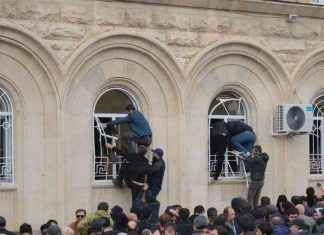”Closed mouths is a lot of depth to plumb up / the it is that all the definitions to despite the fact / is the sea,” writes Agnes Lidbeck in the poetry collection ”Out of” (2018). It could have been a literary creed. Lidbeck’s interest for the dialogue or plot. She lets out a replica to fall down in the water and follow the rings that spread around it. Explore the osagdas the ripples on the tip of the tongue, the inner voice incessant lapping of waves and the halvmedvetnas känsloströmmar. What she finds in the spiritual depths? They are full of ytligheter.
the Characters in her stunning novels occupied of how they appear in each other’s eyes. They do not see other people, reflects itself only in them. It comes modern in the debut of ”Finding themselves” (2017), systraparet in the ”Veil” (2018), and the father in ”lost”, trilogins last part also links the the previous.
father, a räddhågsen psychologist who bakes sourdough bread, the laws of the steaks and assemble the trampolines. Lift the daughter of the stall and balettskolor. Think of divorce, both as a big bogeyman, and the erotic imagination. As always with Lidbeck produced the nuclear family as a timed division.
None of their many mansroller – father, husband, son, and lover – mastered Anders so good. He beats his daughter (but his wife says he is ”not such as really”), cheats on his wife (but infidelity is normal in long relationships, he knows) and is jealous of their mother-daughter relationship and their girlfriends. What are they talking about, really? Why can’t he be with?
His inner sea seems shallow. His observations and interactions approaching nidbilden of an emotionally trögfattad man. So much of what he sees walking him past. The daughter’s sad face becomes a fine motif for a Instagrambild, nothing else. And does not take himself that it is something that they are missing him.
the thoughts sometimes to the Jonas Hassen Khemiris ”Pappaklausulen”, which also affects performance anxiety before fadersrollen. Also there may livsdramatiken place at the shopping carts or boards, in vardagsstressade quarrel about the niceties. And the authors are united by the safe språkhantverket: filling meningsflöde, low-key comedy, precisely selected samtidsmarkörer and excellent touch with the inner monologues.
But where Khemiris point of view, unites the clear-sighted with the tender, writes Lidbeck with a isskärva in the eye. Her look at their romangestalter have a lot in common with their suspicious glances at each other. Zealously drawn to the ugly and to errors, to the all that is meanly, false, or selfish. She is futtighetens epic poet, whose literary world does not accommodate some of the heavens, just a roof.
One way to handle this demanding gaze is to take the deepest gravity. Even if Lidbeck rarely moraliserar, it is possible to read her as a insistent moralist. In short: someone who believes that there are good and bad ways to trade, and that we should strive for the good. Someone who is passionate about to pay attention to the shortcomings in the interpersonal. Someone who says: do not do so here.
”the Morale we have well grown out of,” think Anders himself, ”it makes no sense to punish himself for his humanity.” His ethical laxity and its consequences is possible to describe with kraftuttryck as sin or load – difficult words, since they are now most associated with the fill, sex and gluttony. But the story of Anders allows himself to be read as a contemporary study in other huvudsynder: wrath, envy and pride. The reading must not be a catholic to do.
motivated by psychological interest. Then the narrator is someone who draws up a psyche in cross section, and shows how it beautifies, forget and overlook. Someone who says: why does he do so here. For Anders may appear to be beyond redemption, but never beyond comprehension. As a perpetrator, but never that much different. Self-deception is both a common condition and a conditions of life.
So is the given reason: the bug, the lack, the loads create more interesting literature. ”Find themselves” and the ”Veil” was too close to reality to be able to be read as satire, but was too pointed to be able to engage the reader with the same means as a traditional realistic novel. It was not a problem, but on the contrary it that gave these works their distinctive character, and let Lidbeck approaching literary over-exploited areas without risking its relative originality as a narrator.
Still, I am pleased that the characters in ”lost” is characterized by greater gravity and more shades. In the last chapter (maybe all that precedes only one prolog) meets the reader less of distanced humor and more of the stretch uncomfortable atmosphere. Two mouths which has been long closed, try to talk, but the opportunity has been lost. No one reaches.
slightly more than a samtidskritisk sedeskildring. Looking beyond the exquisite laughter that permeates the Lidbecks prose seems suddenly the whole book as a basically tragic portrait of a livslögnare, signed with the wide lines, but slight of hand. The grief it sleeps is a bare edge before which I shudder.







